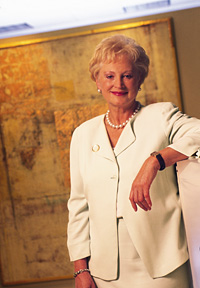
|  |  |  Editorials | Opinions | July 2008 Editorials | Opinions | July 2008  
A Life-Changing Foreign Investment
 Maria Elena Salinas - The Sentinel Maria Elena Salinas - The Sentinel
go to original


| | Christel DeHaan | | |
Every morning at 5 a.m., second-grader Jessica and her mother leave the corrugated-metal one-room shack they call home on the outskirts of Mexico City and begin a two-hour journey on two different buses so that little Jessica can take advantage of a great opportunity.

After reaching school, her mother continues on two more buses to begin her workday as a maid, while Jessica is provided with a proper breakfast before her opportunity begins. Jessica is one of 345 lucky students who attend a very special learning center that boasts a 97 percent retention rate, and not necessarily thanks to the Mexican government.

During a visit to Mexico City in 1997, Christel DeHaan, a wealthy American businesswoman-turned-philanthropist, was touring several orphanages when she decided that the best way to share her money was to create Christel House, where orphaned, abandoned and disadvantaged children would have an opportunity to become self-sufficient, contributing members of society.

With a yearly budget of almost $2 million, Christel House Mexico operates the high-social-impact learning center, which provides quality education, meals, regular health care, life-skills training and character development, as well as parent and community-outreach programs.

Here children are taught the importance of caring, sharing and making a difference. Ms. DeHaan believes that academic learning must be complemented by character development, a positive self-image and a commitment to caring for others.

It's an expensive, long-term investment that requires a team of dedicated staffers and educators, who spend 10 hours a day, six days a week, with students who otherwise might end up on the streets of Mexico City. It's money spent to change lives.

Securing a place at Christel House is not easy. The waiting list has at least 100 names on it, and every academic year, space limitations allow only 50 children to be accepted. Poverty is a priority, and family stability a key factor.

Parents must participate and interact at Christel House. Many arrive early in the morning to help clean the school, while other parents show up after work to perform their tasks. The parents also must be involved in community-outreach programs. Christel House is registered with the Mexican Education Ministry and provides schooling from first through ninth grades. Graduates are provided with weekly counseling as they enter high school elsewhere, and must return every Saturday and take English and computer courses and maintain a good grade-point average. The alumni serve as role models for the younger children, and receive a modest stipend to help them cover the cost of transportation, books and food.

The philanthropist went on to open Christel House in Caracas, Venezuela, in 2001. Five years later, 108 proud, self-confident students received their high-school diplomas. The investment is paying off, as 71 of these graduates were accepted into local universities or technical colleges and 21 are working a two-year paid internship with a prominent insurance company. Today Christel House operates four learning centers around the world. Its success caught the attention of Oprah Winfrey, who consulted with Ms. DeHaan for suggestions and ideas on operating a school in South Africa.

Back in Mexico, little Jessica is excelling at school. She had some cavities filled by the visiting dentist, and despite her many hardships at such a young age, she has plenty to smile about, thanks to someone who cared to share her wealth. As a result, the work of Christel House and the vision and generosity of someone who made a different kind of foreign investment in an underdeveloped country will be multiplied many times over.

Maria Elena Salinas can be reached at www.mariaesalinas.com. |

 |
|  |



